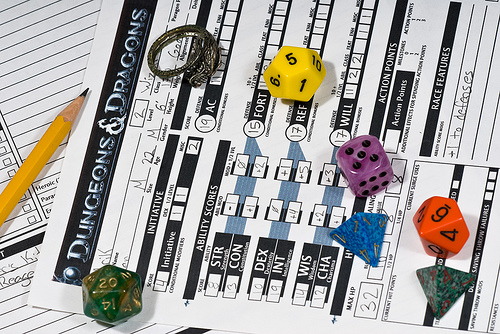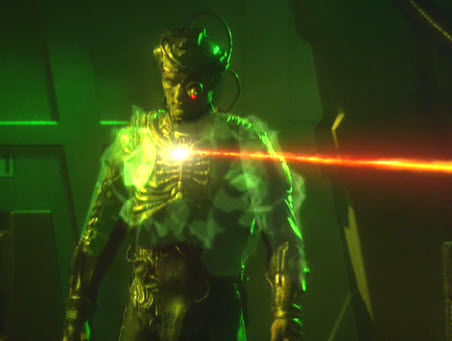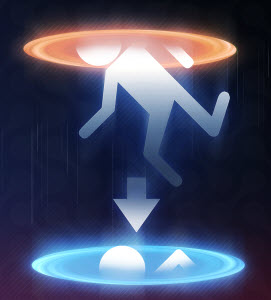The ABCs of GMing
 The ABCs of GMing is an ongoing series about the different skills and ideas needed to run a successful tabletop game.
The ABCs of GMing is an ongoing series about the different skills and ideas needed to run a successful tabletop game.
Knowledge
It’s been mentioned in several previous articles the importance of understanding your players, their characters, and the game system you are GMing. This week, we’ll take a look at “Knowledge” and expand upon these elements.
It’s one thing to know the aspects of your game, but the importance of having Knowledge of your game translates to an understanding of your players as well as the ability to see the potential of their characters, even if the players don’t. As a GM, you’re the one in control of the setting, the antagonists, and the continuing theme of your story. Proper Knowledge will combine all of these elements into a fun game for everyone involved.
Know The Math

At least it’s not THAC0
Part of understanding the game you’re running is comprehending the math and other calculations behind it. Take for example, a standard d20 system. Let’s say your party has a single fighter – the one character whose sole purpose is to smash the bad guys into bits. Aside from a variant character build, the fighter likely has the highest attack bonus in the group.
Let’s say his attack bonus is 10. As the GM, you can use this as a guide for how difficult a party encounter could potentially be. In a flat-out physical fight, you can deduce that this fighter has a 75% chance to hit an enemy with an armor class of 16, and assuming he’s the best attacker in the group, the rest of the party will have a lower chance to hit their enemy in the same manner. Increasing that armor class to 21 reduces the fighter’s chances to 50%, and even lower for the rest of the party. Therefore, the group will have a harder time taking down this particular bad guy.
This is just a basic example. There are plenty of other factors to consider, such as magical damage, elemental damage resistance, sneak attacks from a potential rogue, how much damage can be done by the fighter in one hit, or the ability to calculate averages based on these factors. The point is, knowing the math behind your system helps you get a good sense of how the party will fare against their opposition. While there’s plenty of variability within die rolls themselves, knowing the basic numbers can be a useful guide when putting together a story and designing your game’s foes.
You Know What’s Coming…

Oh good. They’re adapting…
As the GM, it’s your story the players are working through, and it’s your antagonists. What you cannot predict is how your players will develop their characters. Maybe the mage at some point takes a change of tactics from dealing damage to being the party buff, making other characters stronger and faster. This will change how your players tackle oncoming threats, and that can lead to unexpected tactics against the Big Bad Guy you created three weeks ago.
Use this knowledge to your advantage in your game. Your party deserves recognition for developing a new way to tackle whatever is thrown at them, but it shouldn’t turn their battles into walks in the park. If your party has grown accustomed to using one specific tactic repeatedly, redesign an enemy so they are resistant to that tactic. Even if the players see that the GM has developed something specifically to prevent their new exploit, it will teach them a lesson to never rely on one trick to get by.
While both players and GMs have knowledge of the rules of the game, you have the advantage of knowing the story and the enemies ahead. Last minute adaptation is just part of the game, and you wouldn’t be a good GM if you weren’t able to Adapt to your party’s progression to keep the challenges coming.
…And The Party Isn’t Ready

“As you journey onward there’s a nagging – hey what’s that?!?”
While softening an enemy that seems far too able to squish your player characters is part of the game, it’s not always a necessity. You don’t have to sacrifice your well-designed bad guy for the sake of your players, but you need to know and understand your players’ abilities to face that challenge. Once the battle has begun, it’s too late to salvage that character, and you may find yourself dumbing down the enemy mid-fight, leading to an awkward conclusion that seems like the enemy suddenly came down with a case of stupid.
Instead, keep yourself up to date with the party development and skill progression. If the obstacle you have prepared for the next session still seems too harsh, throw in a side quest or a distraction to allow your players more opportunity to gain experience and improve their characters. You won’t actually have to change the evil wizard you put so much time into, and it helps your party avoid an awkward fight that shifts from near-impossible, to somehow probable.
Know The Party’s Potential

If there even is a box.
Finally, as your group’s GM, you should have a better understanding of the system than some (or all) members of your player group. Use this to your advantage to help your players develop skills and discover new ways their characters can be utilized. This is especially important for players new to the system you’ll be running. While sourcebooks provide players with all the information they’d need to utilize and develop their characters, this isn’t a quality substitute for first-hand experience.
Plan your campaigns to introduce situations where players need to think outside of the box. If they don’t quite see their own potential, encourage players to discuss the skills on their character sheets and devise ideas on what to do out-of-character. It’s OK to let some meta game discussion happen if the party is stuck. There’s no real way to say “I have six ranks in Disable Device” in character dialogue. If the situation warrants it, allow this discussion between players if it means your players find new ways to use their skills, or realize the potential of other abilities that they don’t quite understand.
Next time, we’ll cover “Leadership” and how you as a GM can – and should – set the example for being a great player. In the meantime, feel free to let us know if there were any times when some of these knowledge tips factored into your game over on our social media pages.
Photo Credits: Character Sheet by Rob Stites; Borg by Trek Core; Distractions by Brenda Anderson; Portal Wallpaper by McFlyWalker.
